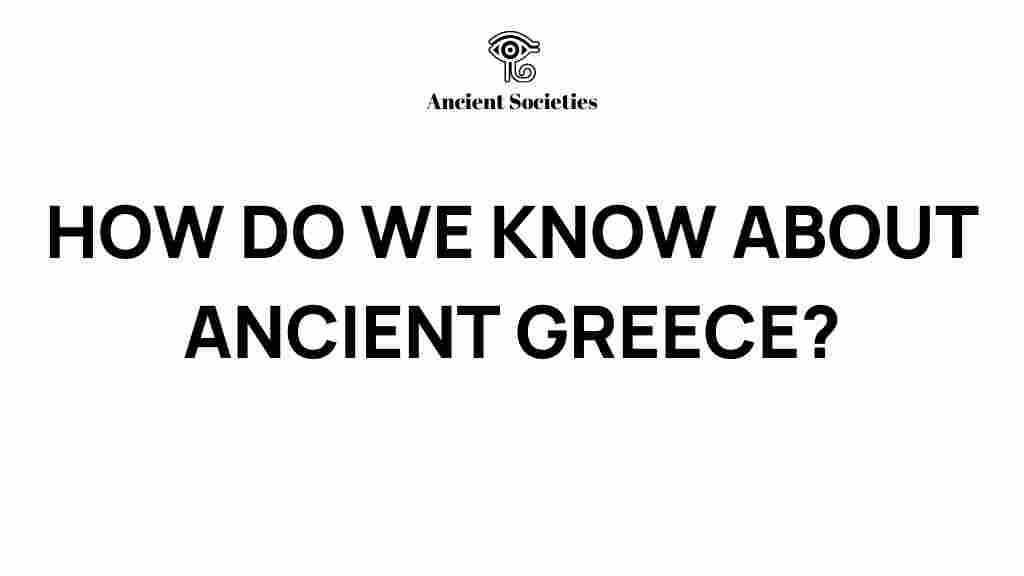Unearthing Secrets: How We Know About Ancient Greece
The fascinating world of Ancient Greece has captivated historians, archaeologists, and enthusiasts alike for centuries. From its profound contributions to philosophy and literature to its rich tapestry of mythology and culture, the civilization has left an indelible mark on human history. But how do we know about this ancient society? This article delves into the methods and sources that illuminate our understanding of Ancient Greece, focusing on archaeology, historical records, artifacts, and more.
Understanding Ancient Greece Through Archaeology
Archaeology plays a crucial role in uncovering the secrets of Ancient Greece. By excavating sites and analyzing material remains, archaeologists have pieced together the daily lives, social structures, and cultural practices of this remarkable civilization.
- Site Excavation: Archaeologists meticulously excavate ancient sites, such as the Acropolis in Athens and the ruins of Delphi. These excavations reveal buildings, pottery, and tools that provide insight into the lives of the Greeks.
- Artifacts: The objects found during these excavations, known as artifacts, are invaluable. From vases adorned with mythological scenes to everyday items like cooking utensils, artifacts help reconstruct the material culture of Ancient Greece.
- Architecture: The architectural styles of ancient temples, theaters, and public buildings offer clues about Greek religious practices, civic life, and artistic achievements.
Historical Records: The Written Word
In addition to archaeological evidence, historical records provide significant insights into Ancient Greece. These records include writings from historians, philosophers, and playwrights who documented their society.
- Herodotus: Often called the “Father of History,” Herodotus wrote about the Greco-Persian Wars and provided descriptions of various cultures and customs of the time.
- Thucydides: His account of the Peloponnesian War is a critical historical source that examines the conflict between Athens and Sparta, emphasizing themes of power, politics, and human nature.
- Plato and Aristotle: These philosophers not only explored metaphysical ideas but also wrote extensively on ethics, politics, and society, offering a glimpse into the intellectual climate of Ancient Greece.
The Role of Mythology in Understanding Culture
Mythology is integral to understanding the culture of Ancient Greece. The myths and legends not only entertained but also conveyed moral lessons and cultural values. They reflected the Greeks’ understanding of the world and their place within it.
- Gods and Goddesses: The pantheon of Greek deities, including Zeus, Athena, and Poseidon, played a significant role in daily life, influencing everything from politics to personal decisions.
- Epic Poetry: Works like Homer’s “Iliad” and “Odyssey” not only narrate heroic tales and adventures but also encapsulate the values of honor, bravery, and loyalty.
- Tragedy and Comedy: Greek theater, with its tragedies and comedies, provided commentary on societal issues, human behavior, and moral dilemmas, further enriching our understanding of Greek life.
Literature: A Window into Ancient Greek Life
The literary contributions of Ancient Greece continue to influence literature and philosophy today. The works of Greek playwrights, poets, and philosophers provide a profound understanding of their society.
- Tragedians: Aeschylus, Sophocles, and Euripides explored themes of fate, justice, and human suffering, offering insight into the Greek worldview.
- Poets: Lyric poets like Sappho and Pindar expressed personal emotions and societal values, showcasing the complexity of human experience in Ancient Greece.
- Philosophical Texts: The dialogues of Plato and the works of Aristotle laid the foundations for Western philosophy, addressing questions about ethics, politics, and existence.
Step-by-Step Process: Uncovering Ancient Greece
Understanding Ancient Greece involves a systematic approach that combines various fields of study. Here’s a breakdown of the process:
- Excavation: Archaeologists conduct site excavations to uncover physical remains of ancient structures and artifacts.
- Analysis: The materials recovered are analyzed using various scientific techniques, such as carbon dating and chemical analysis, to determine their age and usage.
- Interpretation: Scholars interpret the findings in the context of existing historical records and literature to build a cohesive understanding of Greek life.
- Publication: Results are published in academic journals and shared with the public, contributing to ongoing discussions about Ancient Greece.
Troubleshooting Tips: Challenges in Archaeology
While the study of Ancient Greece is enriching, it comes with challenges. Here are some common issues faced by archaeologists and historians:
- Site Preservation: Many archaeological sites are threatened by urban development or environmental factors. Advocating for the preservation of these sites is crucial.
- Interpretative Bias: Scholars must be aware of their biases when interpreting findings, ensuring that their work reflects an objective understanding of the evidence.
- Incomplete Records: The historical record is often fragmented and incomplete, making it difficult to form a comprehensive picture of Ancient Greek civilization.
Conclusion: The Legacy of Ancient Greece
The secrets of Ancient Greece are gradually being unearthed through a combination of archaeology, historical records, and the study of culture. From its profound contributions to philosophy and literature to the enduring tales of mythology, the legacy of this civilization continues to shape our world today. By exploring the artifacts and texts left behind, we gain a deeper understanding of the values and beliefs that defined Ancient Greece.
For those interested in further exploring this rich history, resources such as The British Museum offer extensive collections and insights into Ancient Greek artifacts and culture.
In summary, the study of Ancient Greece is a multidisciplinary endeavor that requires collaboration among historians, archaeologists, and literary scholars. By continuing to investigate this remarkable civilization, we honor its legacy and ensure that its secrets are not forgotten.
This article is in the category Archaeology and created by AncientSocieties Team
